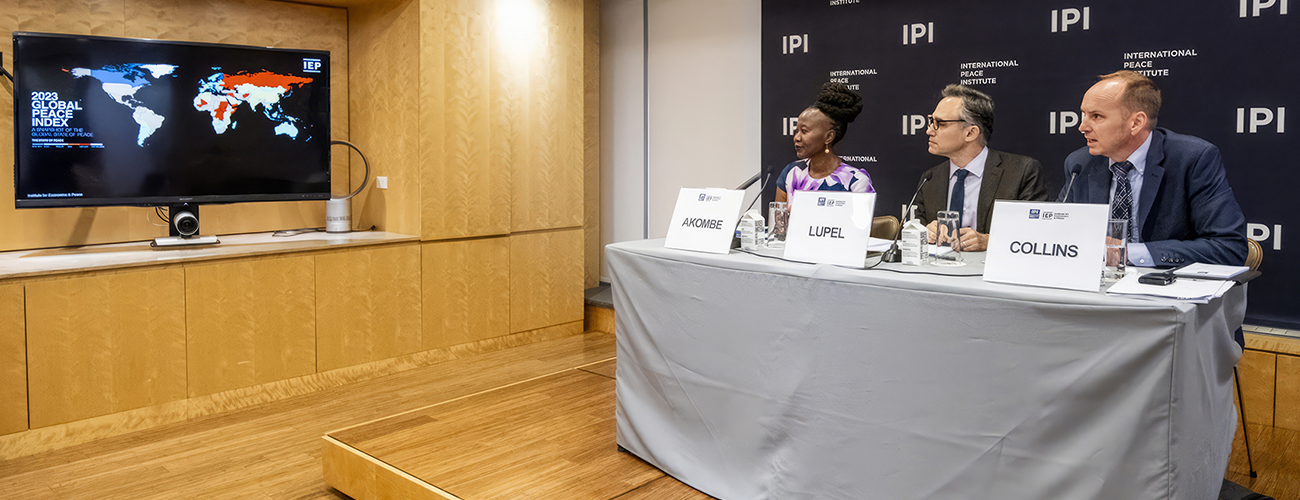How have recent conflicts impacted global peace and what can the changing geopolitical landscape tell us about the likelihood of future conflict? On June 28th, IPI together with the Institute for Economics and Peace (IEP) cohosted a policy forum entitled “A Measure of Peace: Key Findings from the 2023 Global Peace Index,” to address these questions and discuss how they could impact multilateral efforts and national priorities of member states in the future.
Produced by the IEP, the Global Peace Index (GPI) is the world’s leading measure of global peacefulness. It presents the most comprehensive data-driven analysis to date on trends in peace, the economic value of peace, and how to develop peaceful societies. The GPI covers 163 countries comprising 99.7 percent of the world’s population, using twenty-three qualitative and quantitative indicators from highly respected sources, and measures the state of peace across three domains: the level of societal safety and security; the extent of ongoing domestic and international conflict; and the degree of militarization.
Michael Collins, IEP Executive Director Americas provided an overview of key findings from the 17th edition of the GPI. Collins noted that peacefulness has continued to deteriorate this year and is the lowest it has been since the inception of the index. On a positive note, there have been improvements in peacefulness, which include a reduction in political terror, and surprisingly, in terms of military expenditure. While there has been an increase in military expenditure, in terms of GDP it has decreased on a global average. Unfortunately, the 2023 GPI found that “expenditure on peacebuilding and peacekeeping totaled $34.1 billion in 2022, which equals only 0.4 percent of military spending.”
Chief of Peacebuilding Strategy and Partnerships Roselyn Akombe stressed that because the economic impact of conflict is so vast, we need to rethink and focus on peace. Akombe also outlined four takeaways from the GPI, beginning by emphasizing that “numbers count” and economists provide valuable contributions by effectively quantifying peace and providing the data that situates where we are in terms of peace. Second, the GPI is making a business case for prevention. Measuring the cost of war and comparing returns of investment demonstrate the need to collectively work towards peacebuilding and sustaining peace. Third, through reading the 2023 GPI and looking at the key asks of the UN Secretary-General in the New Agenda for Peace, there exists confirmation that we are on the right path. Ending on a positive note, Akombe highlighted that when there are systematic responses towards building peace, it makes a difference. She cited the example of terrorism, which has decreased as a result of concerted efforts to prevent violent extremism and address its underlying causes.
In terms of the devastation that we are witnessing in the world, the trend of internationalized intra-state conflict is egregious. IPI Vice President Adam Lupel expressed gratitude for IPI’s partnership with IEP and appreciatively acknowledged IEP’s work on the positive findings of peacefulness. Lupel and Collings further discussed the positive peace angle, clarifying that while the 2023 GPI found 84 countries became more peaceful, 74 countries became less peaceful. It is much more difficult to build peace than it is to destroy it.
Welcome Remarks:
H.E. Mitchell Peter Fifield, Permanent Representative of Australia to the UN
Speaker:
Michael Collins, Executive Director Americas, Institute for Economics and Peace
Discussant:
Roselyn Akombe, Chief of Peacebuilding Strategy and Partnerships, UN Department of Political and Peacebuilding Affairs
Moderator:
Adam Lupel, Vice President and Chief Operating Officer, International Peace Institute








